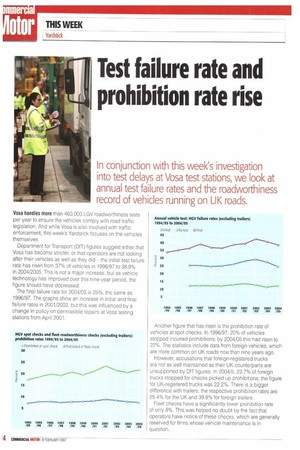Test failure rate and prohibition rate rise
Page 24

If you've noticed an error in this article please click here to report it so we can fix it.
Vosa handles more than 460,000 LGV roadworthiness tests per year to ensure the vehicles comply with road traffic legislation. And while Vosa is also involved with traffic enforcement, this week's Yardstick focuses on the vehicles themselves.
Department for Transport (DfT) figures suggest either that Vosa has become stricter, or that operators are not looking after their vehicles as well as they did -the initial test failure rate has risen from 37% of vehicles in 1996/97 to 38.9% in 2004/2005. This is not a major increase, but as vehicle technology has improved over this nine-year period, the figure should have decreased.
The final failure rate for 2004/05 is 25%, the same as 1996/97. The graphs show an increase in initial and final failure rates in 2001/2002, but this was influenced by a change in policy on permissible repairs at Vosa testing stations from April 2001. Another figure that has risen is the prohibition rate of vehicles at spot checks. In 1996/97, 20% of vehicles stopped incurred prohibitions; by 2004/05 this had risen to 22%. The statistics include data from foreign vehicles, which are more common on UK roads now than nine years ago.
However, accusations that foreign-registered trucks are not as well maintained as their UK counterparts are unsupported by DfT figures. In 2004/5, 23.7% of foreign trucks stopped for checks picked up prohibitions; the figure for UK-registered trucks was 22.2%. There is a bigger difference with trailers; the respective prohibition rates are 25.4% for the UK and 39.8% for foreign trailers.
Fleet checks have a significantly lower prohibition rate of only 8%. This was helped no doubt by the fact that operators have notice of these checks, which are generally reserved for firms whose vehicle maintenance is in question.


























































































































































































